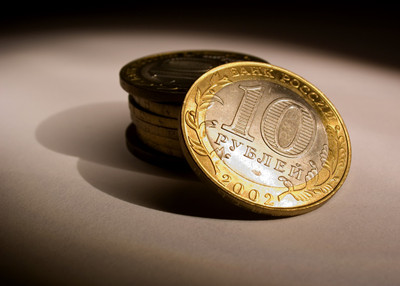俄羅斯和盧布
As ye sow, so shall ye reap
自己種下的惡果,自己承受
The collapse in the rouble is caused by Vladimir Putin's belligerence, greed and paranoia
由于弗拉基米爾普京的挑釁、貪婪以及偏執(zhí),導致盧布崩潰
VLADIMIR PUTIN has successfully suppressed dissent, squeezed out opposition and clamped down on the media, but he has not been able to control global financial markets. In recent days the rouble has collapsed; it has lost almost 40% of its value over three weeks. This is the biggest crisis of Mr Putin's reign—and it is entirely his fault.
弗拉基米爾普京成功壓制了異議,擠出了反對者,嚴厲打擊了媒體,但是他還是沒能控制國際金融市場。近期盧布崩盤,過去三周,盧布價值暴跌40%。這是普京當政期間遭遇的最大的危機—而且這完全就是普京的錯。

Mr Putin will no doubt blame all the usual suspects—Western speculators who bet against his currency, Western imperialists who imposed sanctions on his economy, Western economists who failed to forecast that the oil price (down by half over six months) would fall as far as it has and, of course, Western newspapers that told him that his policies would lead to disaster. But the crisis is the inevitable consequence of Putinism—of aggression abroad and a corrupt-and-control economy at home.
毫無疑問,普京將會把責任歸咎于所有的嫌疑人身上—下賭注反對盧布的西方投機商,對俄羅斯經(jīng)濟采取制裁的西方帝國主義者,沒能預測油價將會下跌到當前水平(過去六個月下跌了一半)的西方經(jīng)濟學家們;當然還有告訴他他的政策將會帶來災難的西方報紙。但是這場危機是普京主義不可避免的結果——國外挑釁加上國內受賄控制經(jīng)濟。
Kleptocracy and its consequences
腐朽政府及其后果
The sanctions were imposed by the West because of his conduct in the Ukraine, where he has, among many things, seized territory, engineered a war and refused to investigate the shooting down of a civilian airliner. Meanwhile, he has failed to reform Russia's economy, leaving it dependent on the energy industry that he has carved up among his friends. Had he chosen to build an economy based on the rule of law and competition rather than patronage and corruption, things would have looked very different.
西方采取制裁是因為他在烏克蘭的行為,他控制了該領土,密謀策劃了一場戰(zhàn)爭,拒絕調查一架民航飛機被擊落的事件。同時,俄羅斯經(jīng)濟改革失敗,使得俄羅斯依賴于他從朋友那里瓜分來的能源工業(yè)上。如果他選擇建立一個基于法制和競爭而不是互利互惠和受賄的經(jīng)濟體系,那么現(xiàn)在就會是另一番景象。
In the short term, there is not a great deal that Mr Putin can do to get his country out of the mess that he has made. A huge interest-rate rise this week, following previous large increases, has not worked. Capital controls are not the answer. They can sometimes be effectively employed against short-term speculation, but in this case investors are rightly worried about an economy that is so reliant on one sector. Anyway, in such a lawless place, capital controls would be porous and could trigger runs on the banks which the country could ill afford. Russia still has reserves of $370 billion, but it also has foreign-currency debts of more than $600 billion.
短期來看,普京不能讓俄羅斯擺脫掉他制造的這個困境。緊接著前期的大幅上漲,本周利率大幅上升,但并沒有起作用。資本控制不是解決問題的答案。資本控制有時在對抗短期投機買賣方面能起到有效作用,但是在這個問題中,投資者有理由擔心一個這么依賴于某一方面的經(jīng)濟是否可靠。不管怎樣,在這樣一個目無法紀的地方,資本控制將會有很多漏洞,而且會引發(fā)擠兌,這點國家將很難承擔。俄羅斯還有3700億美元儲備金,但是他還有超過6千億美金的外債。
To improve the long-term prospects of an economy that is heading into a deep recession, two bigger changes are needed. The first is that Russia should pull back from eastern Ukraine and seek some accommodation with the government in Kiev and the West that could lead to the lifting of sanctions. The second is a change to the country's economic model. Mr Putin needs to take advantage of the fall in the value of the currency to diversify away from excess dependence on oil and gas, which make up two-thirds of exports; to improve the competitiveness of manufacturing and high-tech industry; to strengthen the rule of law; and to clean up corruption. To implement all this he should replace his pliant prime minister (and previous president), Dmitry Medvedev, with a credible economist such as Alexei Kudrin, who was a respected finance minister for 11 years. His oligarch chums might not like this, but Russians would be better off.
為了提高陷入深度衰退的經(jīng)濟長期繁榮,需要兩大方面的改變。第一個是俄羅斯從烏克蘭東邊撤兵,而且還要尋求和基輔政府以及可以解除制裁的西方國家之間的調解。第二個方面是改變國家的經(jīng)濟模式。普京需要利用貨幣價值的下跌,脫離對油和天然氣的過度依賴,進行多元化發(fā)展,提高制造業(yè)和高科技產(chǎn)業(yè)的競爭力,加強法律,清理腐敗。要實現(xiàn)上面這些,他要替換掉他容易擺布的首相(他也是前總統(tǒng)),德米特里梅德韋杰夫,換成可靠的經(jīng)濟學家如受尊敬的財政部長亞力克西庫德林,他已任該職11年。他的寡頭政治家朋友們可能不喜歡這個,但是俄羅斯人可能會更富裕。
Sadly, none of this is likely to happen. Mr Putin will probably double down, railing against Western iniquity, stifling all dissent at home, destabilising Ukraine still more and interfering further in other neighbouring countries. And he will pursue a course of growing autarky, severing as many of Russia's economic and financial links to the West as he can.
遺憾的是,兩者都不可能發(fā)生。普京可能會進行雙重打擊,怒斥西方的不公正,壓制國內所有異議,使得烏克蘭的政局更加動蕩,更深入地干預其他鄰國。他會追求自給自足,切斷盡可能多的俄羅斯和西方的經(jīng)濟金融聯(lián)系。
A brazenly nationalist course will impoverish Russia further, making it impossible for Mr Putin to keep delivering rising living standards. He will gamble that the Russian people are foolish enough to trade prosperity for nationalistic fervour. This newspaper hopes he is wrong.
一個厚顏無恥的民族主義進程會讓俄羅斯更加貧窮,也會讓普京更加不可能提高人民的生活質量。他在賭俄羅斯人民足夠愚蠢,愿意用富裕來換取民族主義熱情。本報希望他是錯誤的。譯者:王呆呆












